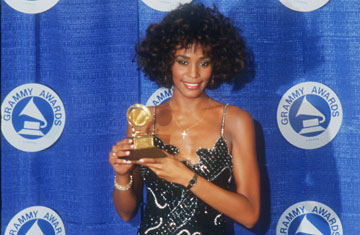
Whitney Houston holds her award for Best Female Pop Vocal Performance at the 30th Annual Grammy Awards March 2, 1987
(5 of 7)
If the teenager felt rebellious, her mood may have reflected the tension between her parents. John moved out when Whitney was 15, though he and Cissy were never legally separated. "They'd laugh a lot," Whitney says. "And when times were hard, they fought, which taught me a lot about love and sacrifice. For a while they stayed together for our sake. Finally they realized that the only way for them to stay friends was to split. It was strange not to have my father there, but he lives just ten minutes away. Besides, even if you're not together physically, the love never dies."
Dionne, who considers Whitney the "little girl I never had," says of the clan, "You don't get in unless we let you in." Whitney was always reluctant to let outsiders in. "I've always been a private person," she says. "In grammar school some of the girls had problems with me. My face was too light. My hair was too long. It was the black-consciousness period, and I felt really bad. I finally faced the fact that it isn't a crime not having friends. Being alone means you have fewer problems. When I decided to be a singer, my mother warned me I'd be alone a lot. Basically we all are. Loneliness comes with life."
At 17, Whitney completed her extended family when she met the "sister I never had." Robyn Crawford -- tall, slim, severely handsome -- was 19 then; they have been nearly inseparable ever since. Four years ago Robyn dropped out of Monmouth College, where she had played basketball on scholarship, and later became Whitney's personal assistant. They share a North Jersey flat with a view of Manhattan. Because of their easy intimacy, the tattle mill has ground out the story that they are lovers. Both women shrug off the rumor. Says Robyn: "I tell my family, 'You can hear anything on the streets, but if you don't hear it from me, it's not true.' " Whitney also alludes to family: "My mother taught me that when you stand in the truth and someone tells a lie about you, don't fight it. I'm not with any man. I'm not in love. People see Robyn with me, and they draw their own conclusions. Anyway, whose business is it if you're gay or like dogs? What others do shouldn't matter. Let people talk. It doesn't bother me because I know I'm not gay. I don't care."
What she cares about, has always cared about, is music. Gary Garland remembers the child Whitney, "dressed up in mother's gowns, down in the basement, singing her lungs out like she was in Madison Square Garden." At eleven, Whitney made her solo debut singing Guide Me, O Thou Great Jehovah at the local Baptist church. "I was scared to death," she recalls. "I was aware of people staring at me. No one moved. They seemed almost in a trance. I just stared at the clock in the center of the church. When I finished, everyone clapped and started crying. From then on, I knew God had blessed me."
Then began the musical education of Whitney Houston, courtesy of Cissy. "I taught her that you don't start loud," Cissy says, "because then you have no place to go. I taught her that songs tell a story, and you don't blare out a story. Control is the basis for singing: up, down, soft, sweet. And diction was very important." You can hear the fruit of Cissy's lessons even in a dance tune like How Will I Know. In the refrain "If he loves me,/ If he loves me not," Whitney really punches that final t. No wonder: Mama was singing backup.
